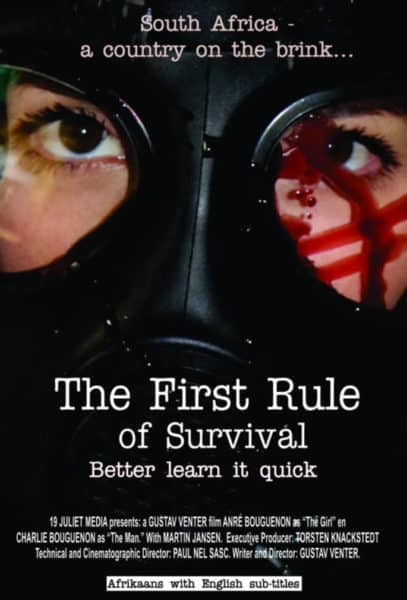The First Rule of Survival
Gustav Venter, American Renaissance, March 14, 2020
The reigning philosophy in the South African arts scene is: black good, white bad. Praise of white achievement is rarely tolerated, and criticism of black behavior is verboten.
The film industry in South Africa, dominated by Afrikaans-speakers, rarely strays from these injunctions. The result is a steady flow of drab romantic comedies and rabble-rousing dramas that decry Apartheid and white privilege. Black and coloured characters are invariably wise, witty, and warm. Whites are mainly obtuse and insecure.
One of the Afrikaans books most beloved by liberals is Fiela se Kind (“Fiela’s Child”) by Dalene Matthee, in which a strong and loving coloured woman raises a white castaway child who is later reclaimed by his backward parents. This book has been turned into a movie, not once, but twice, to much acclaim from the mainstream press. Recently, another liberal literary touchstone, Die Swerfjare van Poppie Nongena (“The Wandering Years of Poppie Nongena”) was released on film. It is the story of a proud, black domestic worker and her abuse at the hands of dull, lazy whites.
One movie that boldly questioned ruling narratives was 2015’s Treurgrond (“Grieving Soil”), which protested the terrorization of farmers in South Africa. However, the producers took great care to fill the movie with loyal blacks, and it includes a scene in which a black farm resident is murdered. It would be too impolitic to suggest a racial motive behind farm murders. The race of the attackers is barely hinted at.
It would be unthinkable for a mainstream release to deal frankly with this topic. Local filmmakers have access to few income streams, and the gatekeepers are all liberals. It’s impossible to get a pro-white movie released in theaters or on television. The government, through its Department of Trade and Industry, gives a 35 percent rebate on film production costs — but only to companies that meet racial quotas.
This does not mean that nationalistic Afrikaners have been idle. They are very effective on social media, and they run a few outspoken websites such as the Pro-Afrikaanse Aksiegroep. Some write subversive novels such as Dan Roodt’s Moltrein (“Subway Train”) and my own Die Amigdala van Alrina Smal (“The Amygdala of Alrina Smal”), which is about a liberal white woman coping with trauma after a black man assaults her.
Of all the forms of entertainment, the Afrikaans music industry best pushes back against the anti-white mainstream. Afrikaans rock, pop, and folk musicians are the most popular. The best-known singer in the country is Steve Hofmeyr, the flamboyant and outspoken white advocate. Venues, sponsors, and television have all blacklisted him, but he still draws massive audiences and is regularly the top-selling singer in the country.
Many Afrikaans musicians are openly proud of their heritage and fiercely critical of the African Nationalist Congress (ANC) government. One song, “De la Rey” by Bok van Blerk, ignited a firestorm of Afrikaner patriotism in 2007, and a group of singers including Ghappie, Chris Chameleon, Adam Tas, and Juan Boucher released a stirring rendition of “Die Gelofte” (“The Covenant”), which infuriated the establishment. Musicians can be successful, in part because they perform in school halls and churches, and have the community market their shows.
There’s more patriotic that Afrikaners have been up to. Last year we wrote, financed, and shot the pro-white film Die Eerste Reël van Oorlewing, released with English subtitles as The First Rule of Survival.
The film is set in the near future. South Africa has devolved into the anarchy we know is coming. A naive, apolitical girl, fleeing from the city, reaches a secure bunker from where she must defend a secret installation that is the key to survival. She must learn how to fight, and also why it is necessary to fight. She is guided by the designer of the installation, as well as a critically wounded man. As the enemy closes in, the three of them reflect on what it was that led to this sad situation, and what it will take to get out of it.

My hope is that every Afrikaner will see the film, even if it is just to remind them of who they are. I would love for our white American and European brothers and sisters to see it as well. Hollywood’s releases aren’t much better than the South African mainstream, and The First Rule of Survival will be riveting and thought-provoking to whites facing demographic doom anywhere in the world. In a sense, it is a warning to the world’s white nations: Don’t ever entrust the future of your children to the reasonableness of unreasonable people.
The First Rule of Survival can be streamed here for $4.50.
[Editor’s Note from Chris Roberts: I watched this movie a few days ago and was impressed. I encourage readers to watch it. Whites should support each another, especially in the arts.]















